#watcher divorce saga
Explore tagged Tumblr posts
Text
You know, by the end of this divorce saga, I want a full kardashian-style freakout where shane throws a purse at ryan, and ryan starts complaining about his diamond earring being lost in the ocean. Please make this happen.
#watcher divorce saga#watcher#watcher entertainment#ryan bergara#shane madej#mystery files#mystery files debrief
249 notes
·
View notes
Text
I want to talk about all the details I put into the Ties comic cause I worked on that thing for like a week and my brain likes to think about many things
Anyway, pspspsps I'm info dumping about my own designs gather round.

Notes for the character designs themselves
-The colours show if they are Red/Yellow/Green are different per character. Tango with bright colours, Skizz's are cool and dark, Impulses are more yellow, and Ethos are more desaturated. -Not all characters in the Life Games will get colour indicators in their eyes, the fact 3/4 of the designs here have it is unimportant shut -Impulse has a heart knot in his tie!! Look at it!! -Impulse cannot tie a tie. Tango does it for him. -Tango having his tie undone is his own choice -The choice of them having/not having pupils is intentional. -Etho only has the one on one side, maybe its cause the red eyes a little fucky in the vision, who knows though -Impulse has i's in the eyes -Skizz just straight up doesn't have em, but I normally don't draw pupils with that iris shape anyway. something something normally only draw that iris style with certain magical characters -I just stopped drawing with Tango with iris' at some point, idk -Skizz is designed as a fallen angel. that's why the halo's are all separated/broken, and why you can see darker feathers growing -maybe Impulse used to help him dye them white cause of some insecurity, maybe not -the lower his lives go, the less dark feathers are seen in his wings. like a cruel joke the watchers get a kick out of
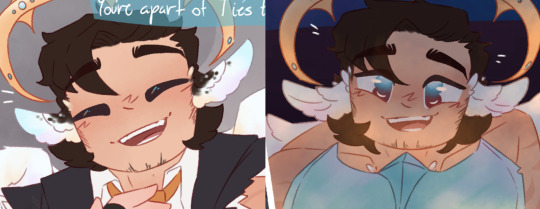
-mullet Skizz MULLET SKIZZ!!!!!
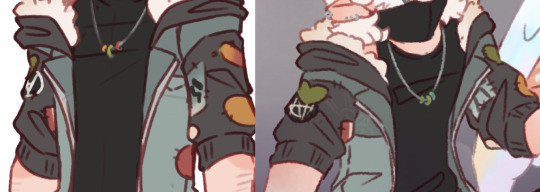
-Etho is a sentimental mf /pos. they will keep and make a lot of patches for memory's and stuff. notable patches are, The NHO patch, a creeper cause of general Spazz, Canada flag cause Canadian /j, I normally add rainbow ones for the button saga of s7 but forgot to this time. -the rings are from all their divorces /J -the colours on the rings correlate to their owners (Bdubs, Cleo, Joel) lives. ie will be red if one of them is red kinda thing.
think that's the most of the design thoughts, now the Details in the comic itself,,,
-Skizz is the kinda mf who would fiddle//stim with random things in his hands. Many times its other peoples hands -dude will just hold peoples hands randomly when talking to them, team Ties just got used to it -That's why Etho took so long to notice the bracelet!

-their ass isn't phased by this kinda stuff anymore /hj -Skizz just enjoys contact man let me be -Throughout most of the comic Skizz has some sort of contact with Etho
-Tango and impulse also end up giving Etho bracelets as well -All the bracelets Etho gets share their colour indicator + the colour form the person who made it!

-you can see the colours slowly shift when Skizz ties on the bracelet, something something the magic of the world does some shit sometimes man.

-Skizz taught Impulse how to make the bracelets, so they have similar styles, Skizz's is more of a simple braid style though. -Tango went for something that took longer to do. it is a little scuffed /pos
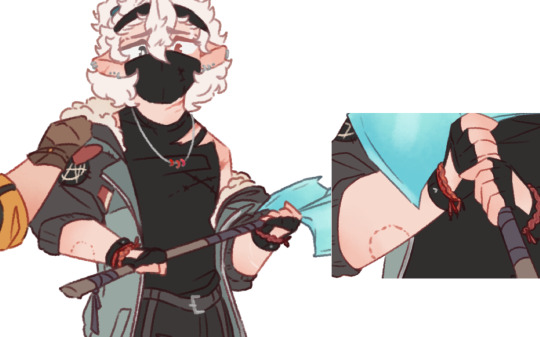
-Ethos been getting their ass handed to them the episode before this, had to rightfully reflect that. you know? /j -the Slashes across their chest where form when Gem/Cleo killed them twice in that one episode. -The bite was originally supposed to be cause of Scars dogs. But someone in a reply made a joke about it, and frankly I think it'd be funnier if it was cause of Joel or some shit like they said.
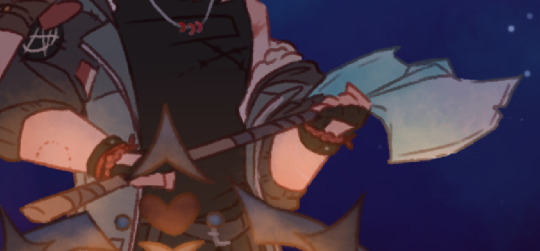
-Had the axe as more of a battle-axe style. It was something Impulse made for Skizz (I forget who actually made it//Didn't want to go back to check) -I like showing characters having specific styles/ways they make armor and tools. -It's fun to show characters with tools and armor that can be distinctly seen as being made by another player
-That being an axe Impulse made adds more weight to the narrative of this moment and I want people to cry -something something for Etho its a moment of taking a weapon that Impulse made to protect Skizz, and using that as the tool that finally kills him -For Skizz this is a moment of his trust and care for his teammates. Being surrounded by people that he cares about and tokens that show their love for each other.
-Suffer, I could have been angstyier, and I will be actualy.

-Skizz is the one putting the axe to his own neck in this moment. Etho is putting as little force into it as they can. -Red king parallels who- -Etho also gets cut by the axe, something about sacrifice and how no life/time can truly be free in these life games -The blood wasn't actually intended to be golden ichor, I was just lazy and didn't want to draw red blood// wanted to have the cool lighting effect -Etho has the same colour in their blood too so, take it as you will
-I've had this comic planed since EPICODE ONE. had full intentions for it to go angsty in the end, and dam if the narrative didn't play right into my grubby little hands.
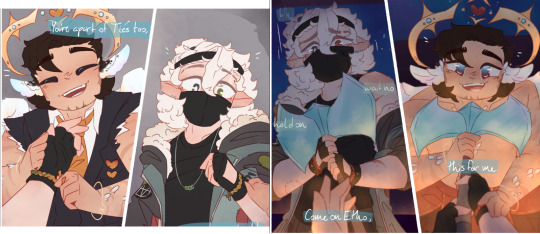
-I also just love how well I could parallel the moments in this comic. the comparison of the pages where both their faces are visible? the Joy in ethos face turning to complete anguish? the fact Skizz never stopped smiling? the way both moments start with an outstretched hand, and end with Skizz still holding onto Etho in a moment of trust? beautiful
-all the pages in the second part of the comic were framed specifically so I could avoid drawing Skizz ass.
#word dump#headcanon dump#limited life#fitzs' comics#legally#ethoslab#skizzleman#tangotek#impulsesv#I came back around with a steal chair frfr#tw blood#just in case#I carry so many thoughts about my works man. I just never talk about half of them#fitzs art#the never shown Fitzs ties references /hj
456 notes
·
View notes
Text
From the moment a shaky, expletive-filled video emerged of Russian mercenary leader Yevgeny Prigozhin’s private plane plummeting from the skies near Tver, speculation has run rampant. Whether sabotaged, bombed, or shot down, such a public and spectacular elimination of such a high-profile political challenger precisely two months following his insurrection, we���re told (with good reason), could only have been the handiwork of Russian President Vladimir Putin.
Yet what the entire Prigozhin drama—from mutiny, to accommodation, to fiery demise—means for the Putin regime has been wholly speculative, because our well-worn metrics of regime strength tell us little about a personalist autocracy where political power has become divorced from popular sovereignty. Without a better framework for understanding Kremlin politics, predictions about the future of Putin’s Russia increasingly rely on conjecture, hand-waving, and wishful thinking, with little thought to the mechanisms of political change.
Two months ago, the speed and ease with which Prigozhin’s Wagner mercenaries moved from their positions in Ukraine, took Rostov-on-Don, and sped toward Moscow—and then relented just as suddenly—surprised political watchers in Russia and around the world.
At the time, many made breathless predictions about the Putin regime that failed to materialize. Prigozhin’s Wagner mercenaries did not march on the Kremlin and topple Putin’s regime. The demoralized Russian military in Ukraine did not fall back in disarray: The front did not collapse, and the war did not end. Indeed, the Russian defenses seem to have stymied the much-anticipated Ukrainian counteroffensive.
Domestically, Russian political, military, and economic elites have not fractured, leading to the anticipated mass chaos (“bardak” in Russian) or civil war. The Russian Federation did not fragment and dissolve into its various ethno-national regions. The Russian state did not collapse. Neither did Putin.
In fact, Moscow, its people, and elites seem to have dusted themselves off from the Prigozhin mutiny and returned to “normalcy,” or whatever passes for it in Russia these days. “Spin dictator” Putin has employed diplomacy and the Kremlin public relations machine to reassure allies and Russians that all is calm and well. Even the anticipated mass military purges and upheavals have failed to materialize. Beyond the very public disposal of Prigozhin, other Kremlin personnel decisions appear to be both marginal and handled far from the public eye.
Yet the most curious legacy of the Prigozhin mutiny was the near-universal consensus that it had “weakened” Putin’s regime. Ukrainian President Volodymyr Zelensky called Putin’s response to the armed Wagner rebellion “weak.” Former U.S. ambassadors to Moscow for the Obama (Michael McFaul) and Trump (John Sullivan) administrations gave identical assessments. Russia-watching foreign-affairs mavens David Remnick, Ian Bremmer, Evelyn Farkas, Tom Nichols, Tom Friedman, Mikhail Zygar, Mark Galeotti, Alexandra Prokopenko, EU foreign-policy chief Josep Borrell, Boris Grozovski, Timothy Snyder, and virtually every pundit imaginable concluded that Putin was weaker after Prigozhin’s mutiny than before it.
The obviousness of this consensus is matched only by its vacuousness. Not only does no one know what this purported weakness means, analysts don’t even know what it looks like or how it is measured, rendering it all but useless as an explanation for Kremlin politics. It feels right that the rebellion of a onetime ally would hurt Putin—but actually showing how is the challenge.
The brief post-coup career of Prigozhin has only underscored regime strength as nothing more than a journalistic cliché. If Prigozhin’s challenge weakened Putin, then Putin defusing the crisis and co-opting the Wagner units surely strengthened his regime? Nope. According to Brian Klaas in the Atlantic, “Every moment that Prigozhin lived made Putin look weaker,” emboldening his enemies. Max Boot in the Washington Post concurred that Prigozhin’s return to Russia reinforced “the impression of Putin’s weakness.”
So if Prigozhin’s political challenge makes Putin weak, and accommodation also makes Putin weak, then surely we should agree that the spectacular elimination of Prigozhin makes Putin strong, right? Some, like Boot, claim it shows Putin is “as strong as ever”; still others run with headlines boldly proclaiming that “Prigozhin is dead, but Putin is still weakened.”
This is madness. If everything equates to weakness, then regime strength and weakness cease to be useful political concepts.
There are some areas where we can put hard numbers to Putin’s power. We could examine Russia’s military strength or weakness with reference to the number of troops, weapons, and diminishing capabilities and discipline over time. We could examine Russia’s economic weakness by pointing to diminishing GDP, living standards, employment, or the dips in the ruble’s exchange rate—usually portending economic calamities that never seem to materialize. But military power and economic performance are different from regime strength and stability. Politically, what do we look at to gauge whether Putin is strong or weak, much less to determine whether he’s getting stronger or weaker over time?
In liberal democracies—in which sovereignty lies with the people—we equate leadership strength with popularity. And there is a logic to it: A leader will look to remain in power by bolstering their popularity to get reelected. A weak leader will have difficulty rallying support for their legislative agenda and will likely get voted out of office. The leader is gone, but the system endures.
Putin’s Russia, of course, is no liberal democracy but a personalist dictatorship in which the leader is the system. So how do we measure leadership strength or weakness?
Most have begun by simply applying the popular-support metric of liberal democracies: Logically, Putin is strong because of his persistently high public approval ratings, juxtaposed against his widely loathed predecessor, Boris Yeltsin. Consequently, one hallmark of Putin’s two-decade rule in Russia has been a state-run media environment cultivating an image of leadership, swagger, and economic and political stability to bolster Putin’s approval numbers.
Divining just how much public support for the increasingly authoritarian Putin regime is genuine is a tricky business. Pollsters used to simply ask respondents whether Russia needs a “strong leader” or a leader “with a strong hand,” but these subjective results were meaningless, as a democratic Winston Churchill could be perceived as a strong leader just as much as, say, an autocratic Saddam Hussein.
Increasing domestic repression—especially with the escalation of the war in Ukraine—has prompted researchers to devise ever-more creative survey metrics to sidestep conformity pressures and gauge regime support. Still, the fundamental question remains unresolved: How do public image and popularity—genuine or not—matter to the strength or weakness of the regime itself?
In summarizing the state of the art in Kremlin studies, Columbia political scientist Timothy Frye’s 2021 book, Weak Strongman: The Limits of Power in Putin’s Russia, suggests how the practical trade-offs between political repression and fawning propaganda constrain Putin’s political strength and latitude for policymaking. But if Putin was already a “weak strongman” before the war, what does it mean now that he’s apparently even weaker following the Prigozhin mutiny? And somehow weaker still following his assassination.
The answer is that we don’t know, because regime power in Russia has become uncoupled from popular sovereignty and the will of the people.
From the outside, we don’t objectively know how—or even if—relative differences in political strength (however measured) lead to different political outcomes in Putin’s Russia. If we had a better grasp of this relationship, then perhaps our analyses of Kremlin decision-making wouldn’t so often be reduced to constantly invoked Putin-as-a-cornered-rat tropes.
One reason Westerners don’t know how to properly conceptualize regime strength and weakness as a variable in Russian politics is because they repeatedly and mistakenly impose Western liberal conceptions that sovereignty ultimately lies with the people onto a Russian environment where that is no longer the case, if ever it was.
Putin’s decadeslong ratcheting-up of “new authoritarian” repression and propaganda has succeeded in removing the Russian people as a collective political force in Russian politics. An atomized, apathetic people cannot coordinate together en masse to overwhelm the powers of Putin’s authoritarian state. This is not to exonerate the Russian people from the crimes committed in their name but more to lament a pitiable state of affairs.
At the height of the Prigozhin mutiny, many jumping to call it a “civil war”—fearing a “brother killing brother” scenario as the Russian people sided with either Prigozhin or Putin—miscast an elite struggle within the Kremlin as a societal challenge to the political regime itself. Ultimately, such public-uprising scenarios failed to materialize, not only because of public apathy (it’s hard to have a civil war where no one cares), but because regime strength is disconnected from the people in the first place.
When Putin imposed forced conscription for an increasingly unpopular war, many expected massive resistance and backlash against the regime. Instead, the only mass movement was of draft-age men toward the borders. Fleeing the country is an individual decision; mass opposition requires deep societal trust in other would-be resisters not to kowtow to the regime’s truncheons. Whatever social solidarity that, for instance, mobilized Russians to rally against the hard-line Soviet coup of August 1991 has been successfully drained, as an entire generation has grown up knowing only the increasingly repressive Putinist autocracy.
And when Putin launched his ill-advised war on Ukraine in February 2022, many placed their hopes in fantasies that the Russian people would rise up. Dissident oligarch Mikhail Khodorkovsky called for a “revolution” to topple Putin. Pundits publicly wished for putschist elites to do the will of the “long-suffering, much-bamboozled Russian people.” It didn’t happen. After the few sporadic protests were put down by force, there has been not even a hint of an uprising. If Prigozhin’s all-out military insurrection and march on Moscow couldn’t stir the Russian people from their oppression and apathy, it is hard to imagine what could.
This is not merely the usual parsing of opinion survey methodologies to divine whether citizens of an increasingly repressive Russian state are genuine in their support of the Russian president. Instead, this gets at the more uncomfortable core question: Does it matter if the Russian people support Putin or not? Even in the most fundamental political questions—dealing with war and peace—the people seem to be an afterthought.
With political power and regime strength completely divorced from popular sovereignty, the entire notion of a political leader being strong or weak loses all meaning, as it has become unmoored from the bedrock of political authority. Putin’s potential future political decisions may reflect any number of variables—brokering deals between rival Kremlin clans; satiating interpersonal rivalries; weighing military, economic, or geostrategic trade-offs—but attributing any particular decision to Putin’s relative political strength or weakness is an exercise in futility without grounding in popular sovereignty.
An alternative way to conceive of political strength or weakness would be in terms of the potential range of institutional levers, personnel choices, and political options available to the leader. A strong leader—unencumbered by checks on executive power—would have a wide range of options, whereas a weak leader would be more constrained. If we understand Putin to have been weakened by Prigozhin, what exactly is it that Putin cannot do now that he could have done before the mutiny? How has he been constrained? And by whom? If anything, the very public demise of Prigozhin should underscore the unconstrained breadth of Putin’s political options.
Understanding Russia better may mean coming up with better frameworks for explaining Putin-era policymaking—or living with the uncomfortable humility that we simply may not be able to anticipate future political trajectories using such outmoded tools.
3 notes
·
View notes
Photo










Cover Reveal
Title: Musings: An Argyle Empire Anthology
Authors: Becca Vry, Kris Babe, Shari Ivey, Tara Severance, Susan K Swords, Jennifer Locklear, Morgan Locklear
Designer: Jada D'Lee Designs https://www.facebook.com/JadaDLeeDesigns/
Genre: Comedy. Romance. Suspense. Fantasy. Drama. Prose.
Release Date: June 20, 2017
Add to your Goodreads TBR: http://bit.ly/2qseSxp
Synopsis
Seven friends inspired to raise awareness and funds for homeless youth in crisis.
Seven authors with a love for storytelling.
Nine original stories with themes every reader will love.
Comedy. Romance. Suspense. Fantasy. Drama. Prose.
Individual reflections combined into an eclectic collection.
All proceeds to benefit the Philadelphia chapter of Covenant House, in loving memory of Terry Aisenstein.
Foreword by Sylvain Reynard.
Musings Included:
Kris Babe: Walking After Midnight
Shari Ivey: Stranger in a Stranger Land
Jennifer Locklear: Aurora
Morgan Locklear: House Rules
Tara Severance: Slash Pine
Susan K. Swords: Better Than Yes
Susan K. Swords: Everyone Deserves an HEA
Becca Vry: Hopescapes
Morgan Locklear & Susan K. Swords: STUD
Pre-Order Links
Amazon US http://amzn.to/2sap4XH
Amazon UK http://amzn.to/2rxr0x2
Amazon AU http://amzn.to/2qurzU3
Amazon CA http://amzn.to/2qz9yTQ
About the Authors
Becca Vry
A Chicago native who prefers highrise living and hasn't owned or driven a car in over twenty years, Vry is a married, stay-at-home mother of two daughters. When not doing the mom thing, she can be found at Art Galleries, poetry readings, creating something on a canvas or through her keyboard, bounding in the mosh pit at a concert with her beloved husband Maximilian, or on the dance floor of her favorite Chicago Goth/Industrial haunts. No matter the setting, she is usually wearing black and her sidewalk-stomping Doc Martens.
Vry is now branching out into original prose with her first release, Hopescapes. It's an inspirational short story that will appear in Musings: An Argyle Empire Anthology. The story is about the evolution of lifescapes and how the promise of new beginnings inspire many dreamscapes. The theme of this story centers on emerging from the embers of profound loss and hopelessness, to realizing the importance of survival, ongoingness, and the power that comes from re-learning the language of happiness...Two strangers discover that the journey to happiness often comes at a tragic price – the conversation between them, and the connections they realize they share, will alter their perspectives in the most unexpected ways. They will never look at the Chicago skyline, or the broadening hopescapes that expand before them, in the same way ever again.
Vry hopes to release a couple of steamy romances in the near future...if her muse cooperates.
Facebook https://www.facebook.com/BeccaVryAuthor/
Twitter https://twitter.com/BeccaVry
Amazon https://www.amazon.com/Becca-Vry/e/B071J46KXQ/ref=ntt_dp_epwbk_0
Goodreads https://www.goodreads.com/author/show/16675202.Becca_Vry
Kris Babe
Reader, writer, editor. Marketer by day. Politically opinionated. Not fully dressed without a scarf.
So many books, so little time. And so many favorites: The Blind Assassin, Jane Eyre, The Poisonwood Bible, The Amazing Adventures of Kavalier and Clay, The Goldfinch, The Gargoyle, The Dead, the vastly underappreciated Forsyte Saga, almost everything by Dickens.
Outlander and Twific, Shakespeare and Tolkien. IKR?
Yes, I’ve read Ulysses. Yes, I liked the Dublin Murder Squad series better. (And I never did read Finnegan’s Wake—sorry, Professor Boyle).
Twitter https://twitter.com/writingbabe
Amazon https://www.amazon.com/Kris-Babe/e/B0725ZRJHM/ref=ntt_dp_epwbk_2
Goodreads https://www.goodreads.com/author/show/16675198.Kris_Babe
Shari Ivey
A graduate of Valparaiso University, I have dabbled in creative writing on and off since middle school days (first place in that 8th-grade creative writing contest!). My novella, Stranger in a Stranger Land, in Musings: An Argyle Empire Anthology, is my first published work.
When not working or writing, I am an avid music fan, concert goer, television binger and movie watcher. I am divorced with five children - two furry, three not. I am also probably the person in the car next to you, singing like a mad woman or cursing like a sailor.
My genre tends toward fantasy, paranormal and supernatural.
Twitter https://twitter.com/AuthorShari
Amazon https://www.amazon.com/Shari-Ivey/e/B0728KLCKJ/ref=ntt_dp_epwbk_4
Goodreads https://www.goodreads.com/author/show/16675199.Shari_Ivey
Tara Severance
Tara Severance writes in her scant spare time, hoping that one day she'll be able to quit her day job. The Short suspense story, Slash Pine, is featured in the Musings Anthology. If you love mysteries that might be happening in your own backyard, you'll find something here.
Facebook https://www.facebook.com/profile.php?id=100017568124054
Twitter https://twitter.com/tee_dot
Amazon https://www.amazon.com/Tara-Severance/e/B0719TDZVG/ref=ntt_dp_epwbk_6
Goodreads https://www.goodreads.com/author/show/16675200.Tara_Severance
Susan K Swords
Twitter https://twitter.com/SKS_words
Amazon https://www.amazon.com/Susan-K.-Swords/e/B071FJDC4W/ref=ntt_dp_epwbk_2
Goodreads https://www.goodreads.com/author/show/16675201.Susan_K_Swords
Jennifer Locklear
Jennifer Locklear lives in the Pacific Northwest region of the United States. She married her high school sweetheart, Morgan, in 1995. She is the mother of two children, a son and daughter. Jennifer enjoyed creative writing as an adolescent, but set aside her favorite hobby to concentrate on college studies, career and family. In 2010, she rediscovered her passion for writing when her husband recruited her to edit his own stories. They co-authored and published their debut novel, Exposure, in 2014. Since 2000, Jennifer has been employed in fundraising and development for a non-profit organization. She has been a contributing reviewer for the “Bookish Temptations” book blog and is a founding moderator of “Argyle Empire,” an approved fan site for author Sylvain Reynard. She also enjoys participating in charitable activities, both locally and online
Facebook https://www.facebook.com/MorganandJenniferLocklear?ref=hl
Twitter https://twitter.com/RandomCran
Amazon https://www.amazon.com/Jennifer-Locklear/e/B00KQZZNR4/ref=dp_byline_cont_ebooks_1
Goodreads https://www.goodreads.com/author/show/8202703.Jennifer_Locklear
Morgan Locklear
Morgan and Jennifer Locklear met in 1989 as teenagers and became high school sweethearts. They have been married since 1995 and live in the Pacific Northwest region of the United States with their two children, a son and daughter.
Although both enjoyed creative writing in their youth, they have only been working as a writing team since 2010. Since then they have created a dozen full-length and short stories together.
Jennifer has been employed in fundraising and development for a non-profit organization since 2000. She also enjoys participating in charitable activities, both locally and online. In her (limited) free time she is an avid reader.
Morgan has been employed in the hospitality industry since 1998. He has been active in the local performing arts community since childhood with many acting and directing credits to his name. He is also a musician and songwriter and has recorded 6 albums.
Facebook https://www.facebook.com/MorganandJenniferLocklear?ref=hl
Twitter https://twitter.com/MJLocklear
Amazon https://www.amazon.com/Morgan-Locklear/e/B00KR02QIM/ref=ntt_dp_epwbk_3
Goodreadshttps://www.goodreads.com/author/show/8288769.Morgan_Locklear
1 note
·
View note